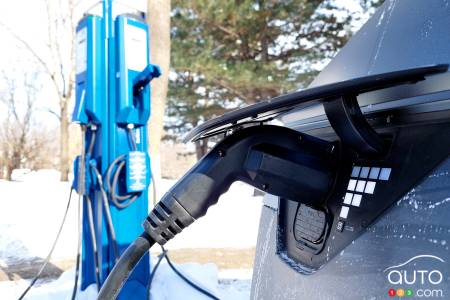The good news for proponents of electric vehicles in Canada is that more of us bought either plug-in electric or all-electric models than ever before in 2021. In the first nine months of 2021, over 65,000 pluggable vehicles found buyers in Canada, up from about 54,000 in all of 2020, according to a new Canadian Press report. Data for the last quarter of 2021 is not yet available.
The bad news in that data is two-fold. First off, the 2020 figure was depressed by the advent of the novel coronavirus, so beating that figure is clearing a fairly low bar. And second, Canada is being outpaced in its switch to electric mobility by several European countries, where governments have implemented stricter emissions requirements and consumers are farther along the EV acceptance road.
Canadian Press provides some illuminating figures to show how we have fallen behind countries like France, Germany and the U.K., let alone world-leader Norway and its Scandinavian neighbours. In 2019, sales of EVs in Canada as well as in the aforementioned Western European countries accounted for between 2.5 and 3 percent of total new-vehicle sales. In the first nine months of 2021, that figure had climbed to 5 percent in Canada, but it soared to 18 percent in the U.K., to 19 percent in France and to 26 percent in Germany.

Joanna Kyriazis, a program manager at Clean Energy Canada, chose an optimistic interpretation, expressing the hope that Canada is merely behind the curve and that we are “about to see that same sort of exponential growth in EV sales if we can get around these supply issues.” The analyst pointed to surveys showing strong demand for electrified vehicles in Canada, which should only grow stronger if gasoline prices continue to rise.
Supply and demand… and government pressure
Kyriazis’ reference to supply issues highlights the fact that the larger obstacle to getting EVs on the road at present is probably not demand but supply. Inventories are low-to-non-existent when it comes to electrified models at dealerships; buyers wanting to get their hands on one of the new crop of BEVs hitting the market this year, for instance the Hyundai Ioniq 5, VW ID.4 and Kia EV6, face waits of 18 to 24 months, according to some estimates.
Meanwhile, recall that the Canadian government has said it wants half of all new-vehicle sales to consist of zero-emission vehicles (comprising all-electric, plug-in electric and hydrogen fuel-cell models) by 2030, and aims to eliminate gas-powered new vehicles from the market altogether by 2035.
So far it has used incentives (in the form of discounts on new EV purchases) to help boost sales of EVs, but there is discussion of imposing federal-level mandates on auto manufacturers and dealers similar to those in place in Quebec and B.C.
Perhaps not coincidentally, those two provinces account for three-quarters of electric vehicles sales in Canada. There is currently some debate about whether incentives or mandates are the more effective route to follow to increase the number of EVs in circulation – automakers predictably favour the incentives route – but in all likelihood it will take a combination of both if those 2030/2035 targets are to be attained.


